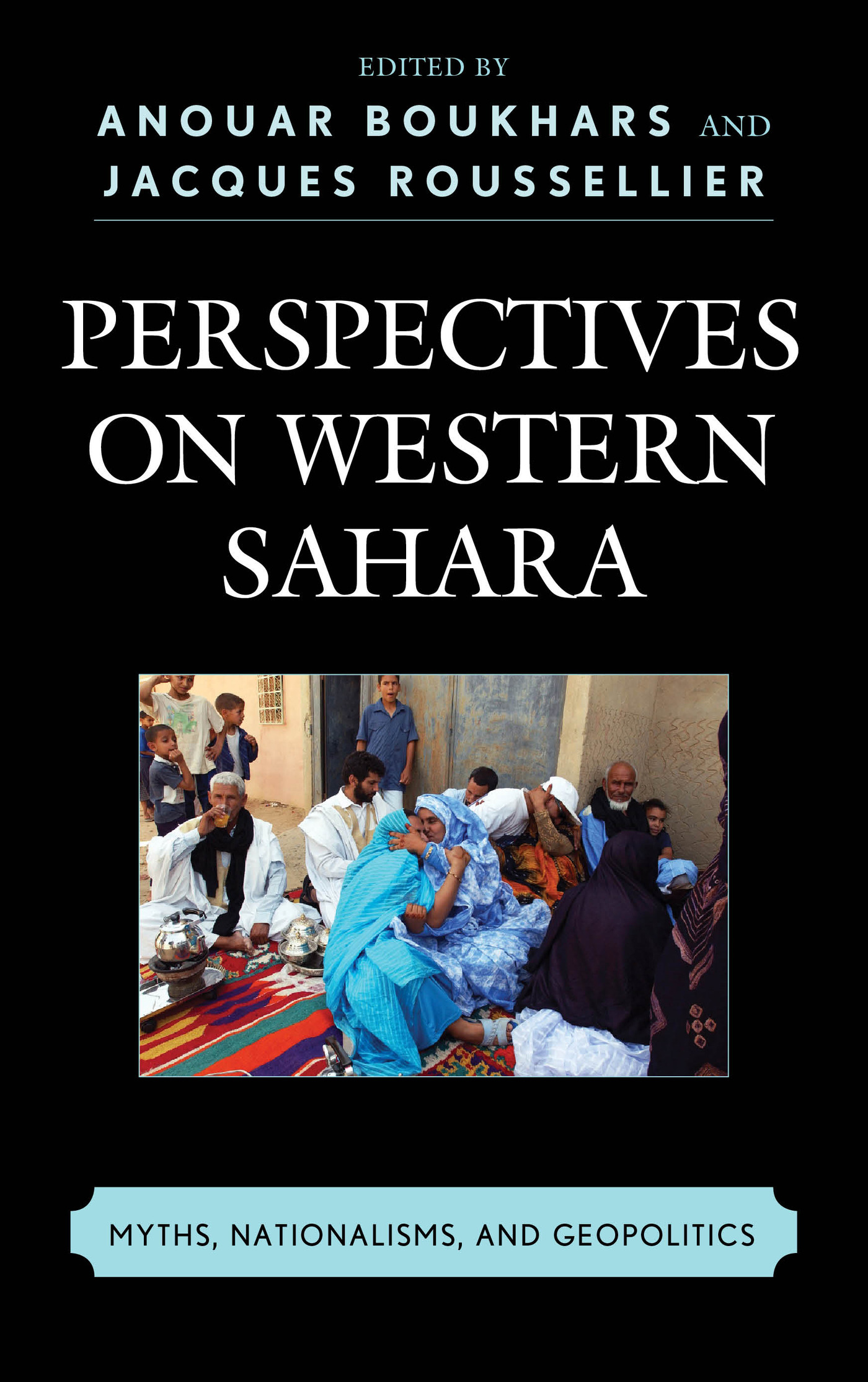Perspectives on Western Sahara
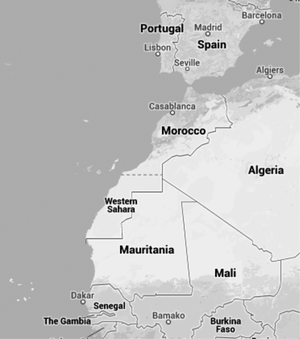
Perspectives on Western Sahara
Myths, Nationalisms, and Geopolitics
Edited by
Anouar Boukhars
and Jacques Roussellier
ROWMAN & LITTLEFIELD
Lanham Boulder New York Toronto Plymouth, UK
Published by Rowman & Littlefield
4501 Forbes Boulevard, Suite 200, Lanham, Maryland 20706
www.rowman.com
10 Thornbury Road, Plymouth PL6 7PP, United Kingdom
Copyright 2014 by Rowman & Littlefield
All rights reserved. No part of this book may be reproduced in any form or by any electronic or mechanical means, including information storage and retrieval systems, without written permission from the publisher, except by a reviewer who may quote passages in a review.
British Library Cataloguing in Publication Information Available
Library of Congress Cataloging-in-Publication Data Available
Anouar Boukhars.
Perspectives on Western Sahara : Myths, nationalisms, and geopolitics / edited by Anouar Boukhars and Jacques Roussellier.
p. cm.
Includes bibliographical references and index.
ISBN 978-1-4422-2685-2 (cloth : alk. paper) -- ISBN 978-1-4422-2686-9 (electronic)
 TM The paper used in this publication meets the minimum requirements of American National Standard for Information Sciences Permanence of Paper for Printed Library Materials, ANSI/NISO Z39.48-1992.
TM The paper used in this publication meets the minimum requirements of American National Standard for Information Sciences Permanence of Paper for Printed Library Materials, ANSI/NISO Z39.48-1992.
Printed in the United States of America
Acronyms
ACSRT African Center for Studies and Research on Terrorism
AFP Agence French Presse
AIS Islamic Salvation Army
ALM Moroccan Army of Liberation
ALN National Liberation Army (Algeria)
AMU Arab Maghreb Union
ANC African National Congress
ANP National Peoples Army
APN National Peoples Assembly (Algerian)
AQIM Al-Qaeda in the Islamic Maghreb
AU African Union
CEMOC General Staff Joint Operations Committee
CEN-SAD Community of Sahel-Saharan States
CMPI Main Military Investigation Center (Algiers)
CNDH National Human Rights Council (Morocco)
CNRT National Council of Timorese Resistance
CORCAS Royal Advisory Council for Saharan Affairs (Morocco)
CRI Regional Investment Center
DEPT Department of Economic Studies and Financial Forecast (Morocco)
DRS Department of Intelligence and Security (Dpartement du Renseignement et de la Scurit) (Algeria)
DSI Direction de la Scurit Intrieure, or DSI (Algeria)
ECOWAS Economic Community of Wester African Stakes
EU European Union
EXIM Export-Import Bank (US)
FAR Royal Armed ForcesKingdom of Morocco
FLN National Liberation Front
FLU Fusion and Liaison Unit (Algeria)
FPA Fisheries Partnership Agreement
GAM Free Aceh Movement
GCF Groupement des gardes-frontires
GCTF Global Counterterrorism Forum
GIA Armed Islamic Group
GPRA Provisional Government of the Algerian Republic
GSPC Salafist Group for Preaching and Combat
GWOT Gobal war on terrorism
HCE High State Council (Haut Comit dtat) (Algeria)
IC Identification Commission (MINURSO)
ICG International Crisis Group
ICJ International Court of Justice
IER Equity and Reconciliation CommissionKingdom of Morocco
IMF International Monetary Fund
LOGA Law on the Governing of Aceh
MINURSO United Nations Mission for the Referendum in the Western Sahara (Mission des Nations Unies pour lOrganisation dun Referendum au Sahara Occidental)
MNLA National Movement for the Liberation of Azawad
MoU Memorandum of Understanding
MTNM Northern Mali Tuareg Movement
MUJAO Movement for Unity and Jihad in West Africa
NCT National Transition Council (Libya)
NEPAD New Partnership for Africas Development
NGO nongovernmental organization
NSGT non-self-governing territory
OAU Organization of African Unity
OCP Office Chrifien des Phosphates (Morocco)
OCRS Common Organization of the Saharan Regions
OHMYM Office National des Hydrocarbures et des Mines
OPEC Organization of Petroleum Exporting Countries
OPIC Overseas Private Investment Corporation (US)
PAM Party of Authenticity and Modernity
PESG Personal Envoy of the Secretary-General
PJD Justice and Development Party
Polisario, or Polisario Front Popular Front for the Liberation of Saguia al-Hamra and Rio de Oro (Frente Popular de Liberacin de Sagua el Hamray Ro de Oro)
PSOE Partido Socialista Obrero Espanol
PUNS Partido De La Union Nacional Saharaui
PVLs Provisional Voters Lists
SADR Sahrawi Arab Democratic Republic
SRSG Special Envoy of the Secretary-General
SM Scurit Militaire
SPLA Sahrawi Peoples Liberation Army
SRCS Sahrawi Red Crescent Society
SRSG Special Representative of the Secretary-General
TSCTI Trans-Sahara Counterterrorism Initiative
UAS Union of African States
UEMOA West African Economic and Monetary Union
UMA Arab Maghreb Union (same as AMU)
UN United Nations
UNGA United Nations General Assembly
UNHCR United Nations High Commissioner for Refugees
UNSC United Nations Security Council
UNSG United Nations Secretary General
UNTAET United Nations Transitional Administration in East Timor
Foreword
This volume of essays speaks to a continuing political debate that is increasingly important in a global community riven by emerging ethnic and cultural tensions. Rather than greater integration within societies, we are witnessing in Africa, the Arab countries, and South Asia a growing emphasis on differences among peoples. The resolution of the Western Sahara conflict, within that context, may help us better appreciate how constructive engagement among participants might, abetted by genuine advocacy for peace, possibly provide lessons for other leaders and analysts as to how to reverse troubling situations before they worsen.
One conflict that has gone on for far too long is the situation in the Western Sahara. In any discussion of this issue, there are scores of proponents on both sides who can marshal facts and opinions as to what must and should be done to resolve the conflict, rarely focusing on what can be done after more than 38 years of an inconclusive state of affairs.
On the one hand, for nearly fifty years, the kings of Morocco, supported by a wide national consensus, have constantly affirmed that their country, as far as the contested status of the Western Sahara territory is concerned, would never accept any outcome that might stop short of endorsing Moroccan sovereignty, let alone result in the independence of the territory.
In the middle is the international community, which early on, through the United Nations General Assembly (UNGA), in its first resolution of December 16, 1965, proposed that Spain, the then UN administering power in the territory, takes all necessary measures to decolonize the territory, while entering into negotiations on problems relative to governing. The UNGA subsequently adopted seven more resolutions between 1966 and 1973 reiterating the need to hold a referendum on self-determination, in line with the Declaration on the Granting of Independence to Colonial Countries and Peoples.
And then, on the other hand, is the Polsario Front, which with the full support of Algeria, argues that the initial resolution supporting a referendum on self-determination is cast in stone, a rather immovable goal despite the fact that decades later it remains out of grasp.
Next page
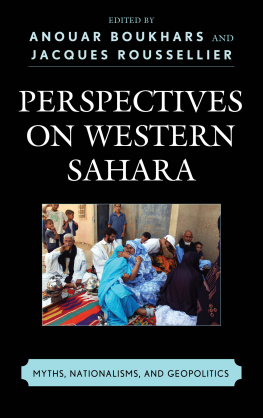

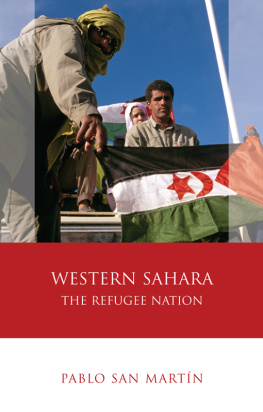
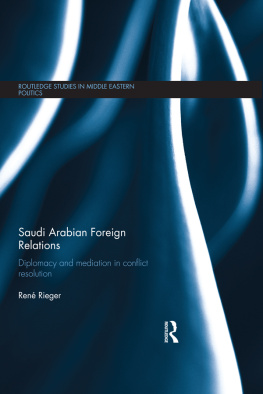
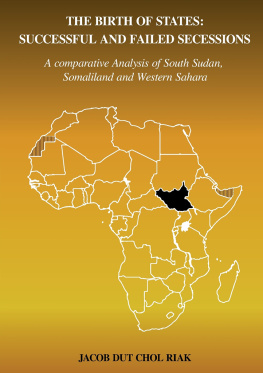
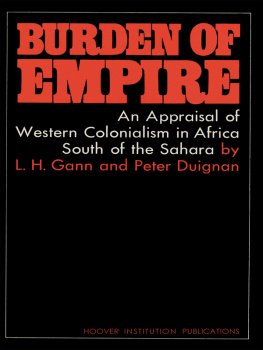
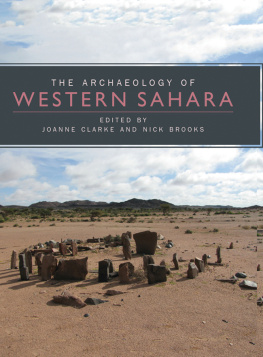
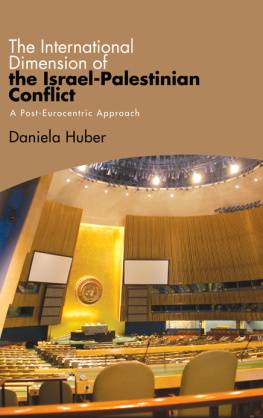
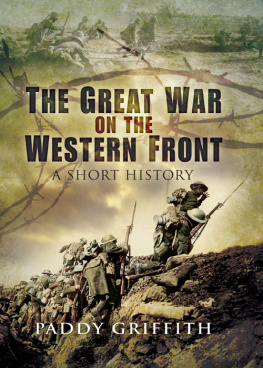
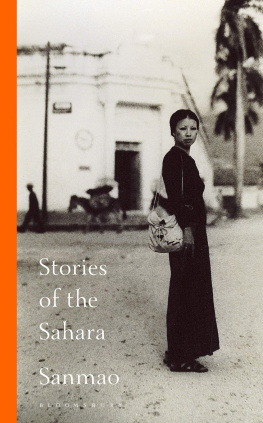
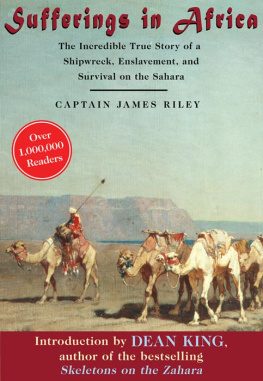

 TM The paper used in this publication meets the minimum requirements of American National Standard for Information Sciences Permanence of Paper for Printed Library Materials, ANSI/NISO Z39.48-1992.
TM The paper used in this publication meets the minimum requirements of American National Standard for Information Sciences Permanence of Paper for Printed Library Materials, ANSI/NISO Z39.48-1992.